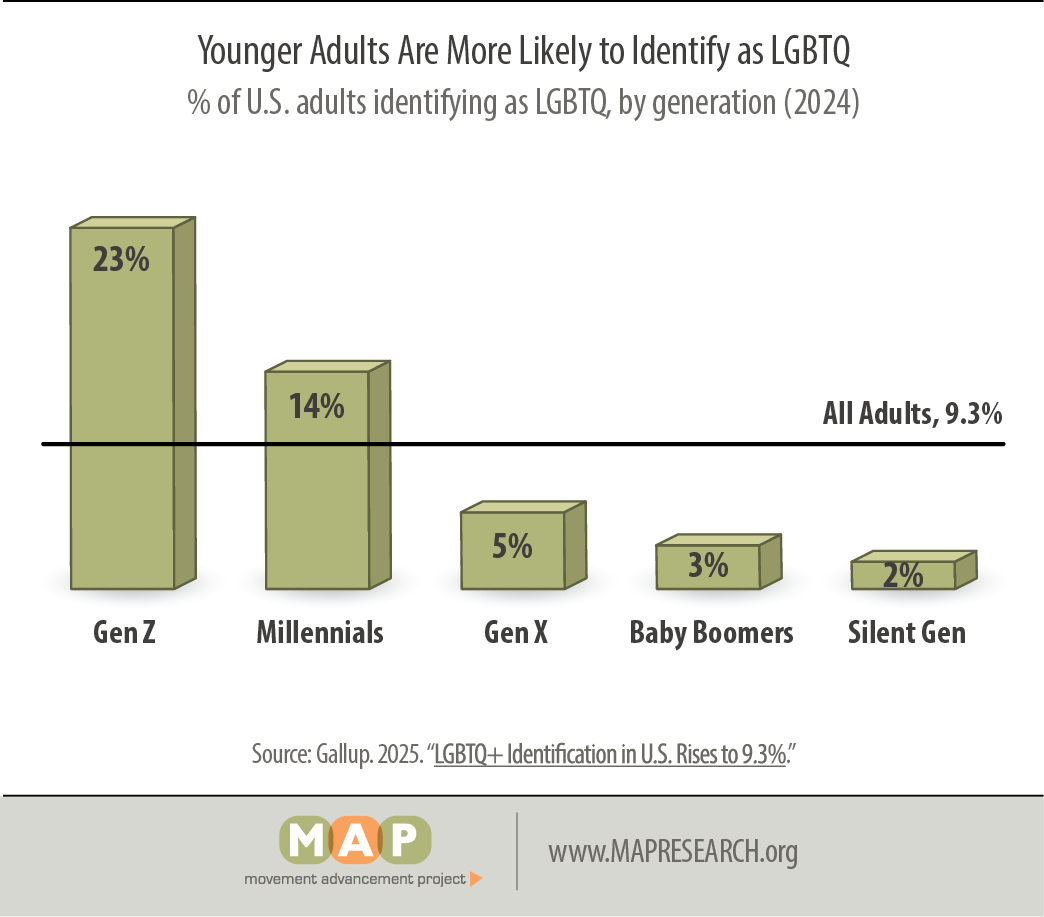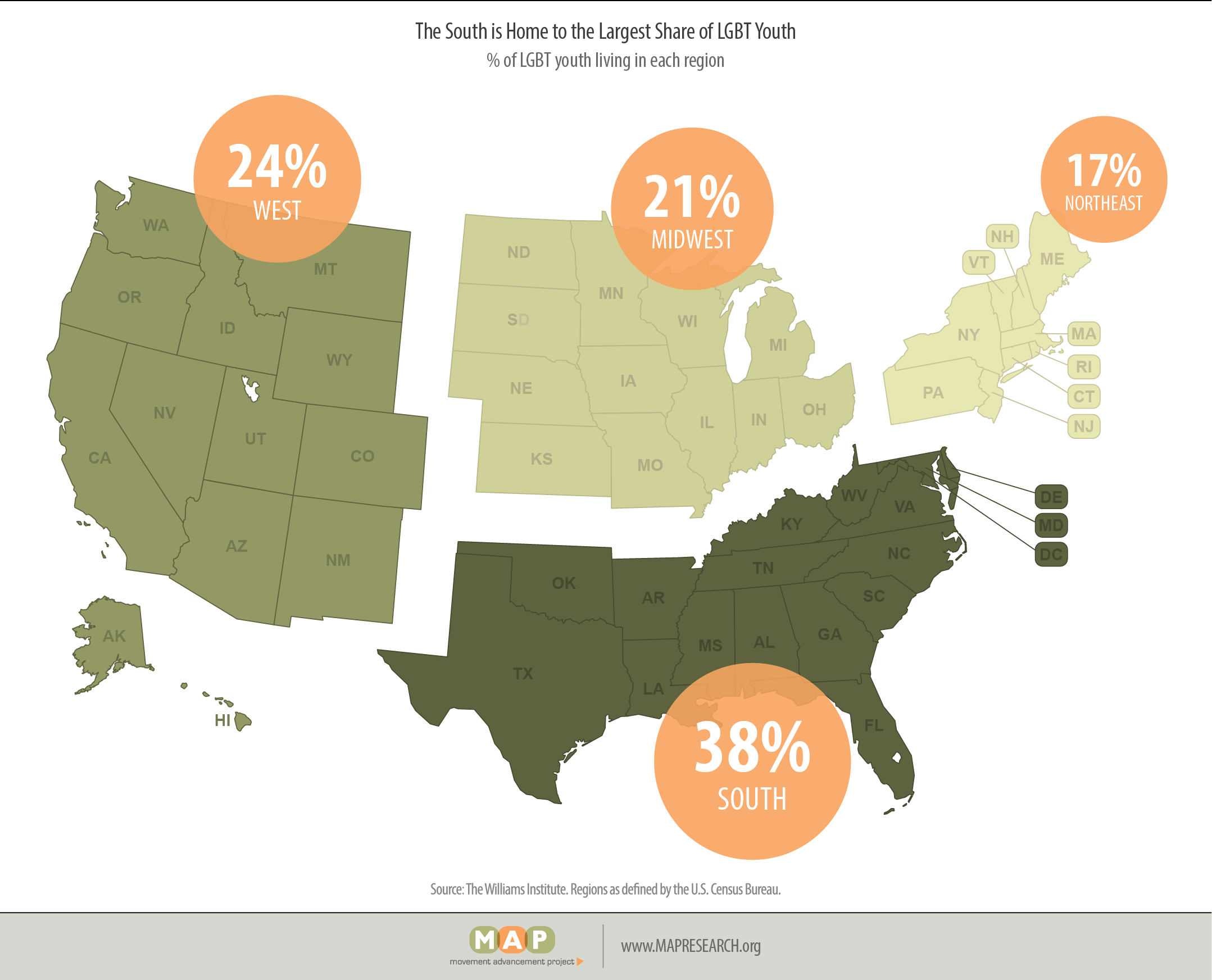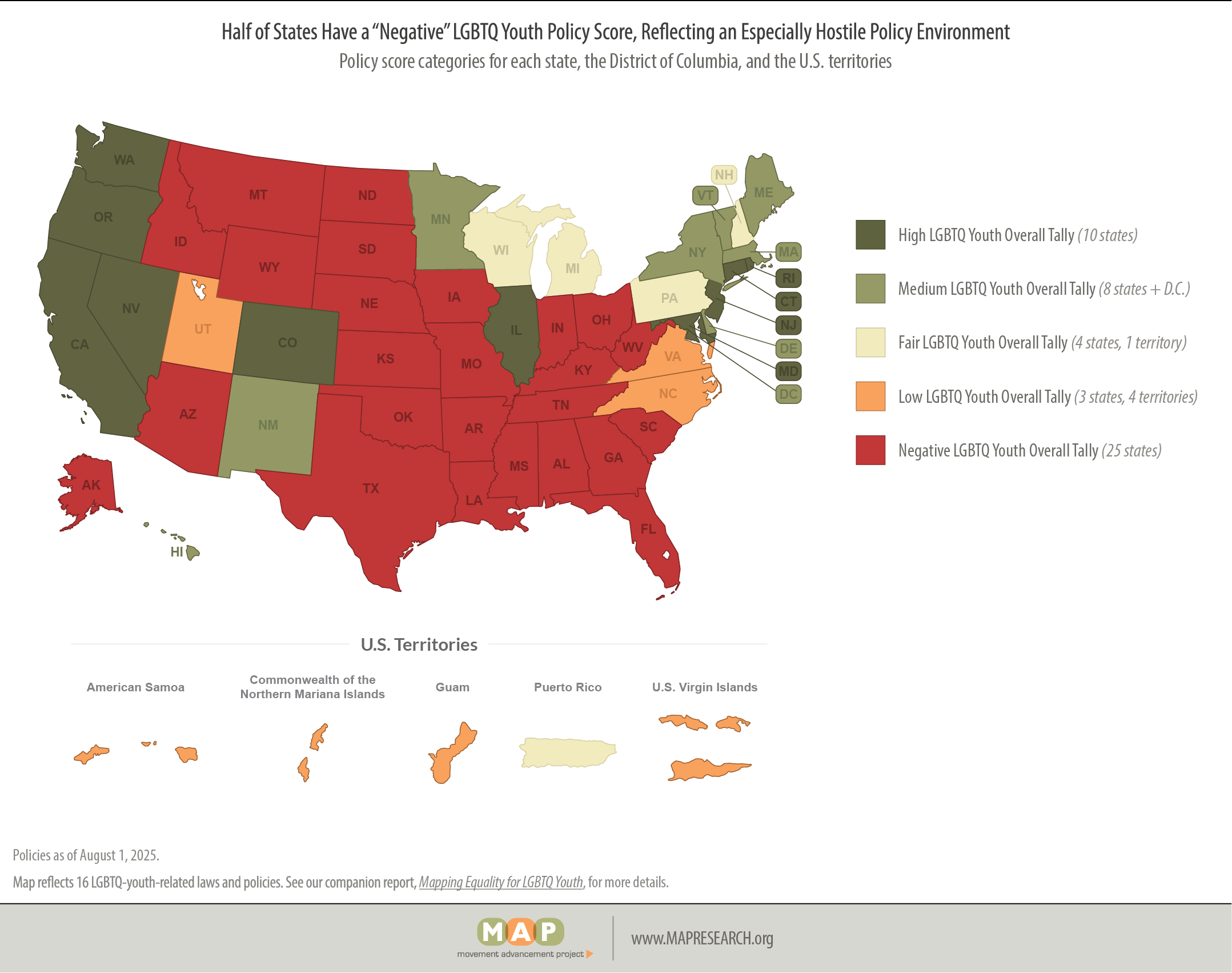MEDIA CONTACT:
Dana Juniel, Movement Advancement Project
September 17, 2025
In many ways, LGBTQ youth are just like any other youth in America: they are creative, curious people trying to grow into confident, fulfilled adults. They live in every community across the country, and they simply want to be themselves, have fun, and be free to learn who they are and work towards their dreams. Like all young people, LGBTQ youth need safety, community, and support. However, as social stigma and discrimination against LGBTQ people, especially transgender and nonbinary people, remain high in the United States, LGBTQ youth often have experiences that make their lives harder. Today, the Movement Advancement Project (MAP), in partnership with Advocates for Trans Equality (A4TE), Advocates for Youth, Equality Federation, GLSEN, PFLAG National, and The Trevor Project, released a groundbreaking report offering a holistic picture of the lived experiences of LGBTQ young people. By combining new insights on who LGBTQ youth are and examining how social dynamics and public policy shape their lives, this comprehensive report expands our understanding of an often overlooked but frequently debated community. The report centers on stories by and from LGBTQ youth about the obstacles they’ve experienced at home, in school, and when accessing health care. The report also offers key recommendations on how to best support LGBTQ youth and ensure they can thrive.
The Diversity and Lived Experiences of LGBTQ Youth
According to recent estimates, more than 2 million youth ages 13 to 17—or roughly 9.5% of all youth in the United States—identify as LGBTQ. Additionally, research clearly and consistently shows that younger people are more likely to identify as LGBTQ, and that more youth identify as LGBTQ than in years past.
LGBTQ young people are incredibly diverse, with a range of lived experiences, including related to their race and ethnicity, gender identity, and sexual orientation. Additionally, the geographic location of LGBTQ youth in the United States can have a big impact on their everyday lives, as different states and regions of the country have drastically different policies that may amplify obstacles and/or opportunities to thrive. Research shows that the largest percentage (38%) of LGBTQ youth live in the South, followed by 24% in the West, 21% in the Midwest, and 17% in the Northeast.
However, it’s important to note that no matter where they live, LGBTQ youth need to be safe, supported, and treated with respect in order to thrive.
In All Areas of Life, LGBTQ Youth Can Experience Acceptance or Rejection
Like all youth, LGBTQ young people’s lives are shaped by certain key areas: their home and family, their broader community, their experiences in school, and their access to health care, among others. This new report analyzes how LGBTQ youth can experience both acceptance and rejection across all of these areas, and how the impacts of both often ripple outward to shape experiences in other parts of their lives. At Home. As with all young people, LGBTQ youth do better with family support, affection, and acceptance. Family acceptance not only positively impacts the health and well-being of LGBTQ young people, but it is protective against negative outcomes. Unfortunately, many LGBTQ youth instead face family rejection. - For example, a 2024 national survey of LGBTQ youth and mental health found that only 2 in 5 (40%) respondents found their home to be LGBTQ-affirming.
Fortunately, there are signs that family interest in affirming and advocating for their LGBTQ children is increasing. - For example, PFLAG—which works to equip families with resources and tools to understand, support, and advocate on behalf of their LGBTQ loved ones—has seen a significant growth in its over 350 chapters around the country in recent years.
In Community. LGBTQ youth emphasize the importance of community spaces where they feel accepted by people outside of their immediate family. These include faith communities, neighbors, after school programs, online communities, public spaces, and community organizations, among others. Despite these examples of welcoming spaces, many LGBTQ young people do not experience this kind of support. - For example, only 9% of transgender youth say their communities are very accepting, and only 8% say that their faith communities are very accepting.
This is why it is critical that LGBTQ youth have places in their community where they feel safe to be their full, authentic selves, receive affirmation from supportive peers and adults, and see imagery, signage, and policies that demonstrate that they are welcome. In School. Outside of their home environment, most youth—including LGBTQ youth—spend the majority of their time in school. Feeling a sense of school belonging is therefore extremely significant. In fact, for many LGBTQ youth, school is a place where they feel safe being themselves: - More LGBTQ youth report that their schools are affirming spaces (52%) than their homes (40%). Research shows that when LGBTQ youth specifically are supported by inclusive school policies and curricula, supportive staff, and affirming student clubs, the effects can be transformative.
Yet data from GLSEN’s 2021 National School Climate Survey also shows that far too few LGBTQ students are able to benefit from these kinds of supports: 68% of students said they felt unsafe at school because of their sexual orientation, gender expression, gender identity, or a combination of these identities. In Health Care. Even though we know that LGBTQ youth need access to quality medical care, care for transgender youth in particular has come under attack in recent years due to increasing political stigma, misunderstandings, and intentional disinformation about the science supporting access to care. Unfortunately, across the country, many transgender youth now live in the over half of U.S. states that ban best practice medical care for transgender youth. Like all young people, transgender youth deserve to be able to access complete and competent health care, including medically necessary care related to their gender. This report talks about the types of affirming medical settings and policies necessary for providers to work with not only transgender young people, but all LGBTQ young people, from a place of knowledge, openness, and cultural competence about all aspects of their health, including mental health.
The Policy Landscape
There is more to life for LGBTQ young people than the laws where they live. However, LGBTQ youth are greatly impacted by the policy landscape, which varies widely from state to state. LGBTQ youth experience significantly different protections in terms of the health care they can access, how safe and welcoming their schools are, and how state-funded entities like child welfare agencies can treat them. Recent, escalating waves of anti-LGBTQ bills introduced across the country—many of which target LGBTQ youth specifically—are politically motivated and designed to distract the public from real issues and stoke fears about the health and wellbeing of LGBTQ youth, especially transgender youth. But in doing so, these policies have had immediate and stark impacts on the wellbeing of LGBTQ youth. According to a 2024 survey from The Trevor Project, 90% of LGBTQ youth reported that recent politics have negatively impacted their wellbeing. In the companion to this report, LGBTQ Policy Tally: Mapping Equality for LGBTQ Youth, MAP offers an in-depth analysis of 16 types of policies that affect the lives of LGBTQ youth. In this index, each state, U.S. territory, and the District of Columbia receive a policy score based on how supportive or harmful its enacted laws are towards LGBTQ youth. As shown in the map below, half of all states have a “negative” LGBTQ youth policy score. The report further shows that more than half of all LGBTQ youth live in places that have passed at least one anti-LGBTQ law targeting youth in the last five years.
The analysis in this companion report also includes policies that can positively impact LGBTQ youths’ lives, such as child welfare nondiscrimination protections and protecting youth from conversion “therapy.” Showing Up for LGBTQ Youth
"Joy is being seen and celebrated, not just tolerated."
— Black trans youth, age 16
(Source: MAP interview, 2025)
In many important ways, LGBTQ youth are just like other young people in America. They need to be cared for, whether at home or in health care; they need to be nurtured and supported by the trusted adults in their lives, including given chances to lead and grow in their own right; and they need to be treated equally under the laws and policies of the places where they live and learn at the local, state, and national levels. The fact is no one is in a better position to identify the supports that LGBTQ youth need to thrive than these youth themselves. The report includes thoughts and recommendations that LGBTQ young people wish to share with their loved ones and broader community, such as trusting that LGBTQ youth know who they are, standing up for LGBTQ youth, and not supporting politicians who advocate for anti-LGBTQ legislation. In addition, the report shares what advocates working with LGBTQ youth and their families have identified as supports that would positively impact youth well-being. All of these recommendations can make a big difference in promoting LGBTQ youth’s health, their well-being, their feelings of belonging and joy, and creating space for them to simply be themselves. +++
About MAP
The Movement Advancement Project (MAP) provides rigorous research, insight, and analysis that help speed equality and opportunity for all. MAP works to ensure that LGBTQ people and their families can live their lives with dignity, safety, and respect by focusing on three key areas: policy and issue analysis, movement capacity, and effective messaging. MAP’s work also covers a broad range of social justice issues that intersect with the LGBTQ movement, including racial justice, economic justice, and healthcare access.
About A4TE Advocates for Trans Equality (A4TE) is an organization that fights for the legal and political rights of transgender people in the United States. Introduced in July 2024 after the Transgender Legal Defense & Education Fund and the National Center for Transgender Equality merged, A4TE is the largest trans-led advocacy organization in the U.S. and brings together experts, advocates, and communities to shift government and society toward an equitable future where trans people live joyful lives without barriers.
“Trans youth deserve to live lives full of joy, discovery, and possibility - just like any young person. But we are seeing a dangerous wave of disinformation and political attacks that deny their existence and seek to erase their rights. This report makes clear that when trans and LGBTQI+ youth are supported and affirmed, they thrive - and when society fails them, the harm is profound. It’s on all of us to ensure that every young person can grow up safe, celebrated, and free."
— Leroy B. Thomas, Director of Public Education, A4TE
About Advocates for Youth
Advocates for Youth is a 501(c)3 organization that champions efforts that help young people make informed decisions about their reproductive and sexual health. Advocates for Youth boldly advocates for a more positive and realistic approach to adolescent sexual health, focusing its work on young people ages 14-24 in the U.S. and around the globe. "Young LGBTQ+ people — and transgender youth in particular — must be able to tell their own stories and participate in decision-making about their lives," said Debra Hauser, President of Advocates for Youth. "We are proud to partner with the Movement Advancement Project on a report that keeps young people's needs front and center."
— Debra Hauser, President, Advocates for Youth
About Equality Federation Equality Federation is an advocacy accelerator rooted in social justice, building power in our network of state-based lesbian, gay, bisexual, transgender, and queer (LGBTQ+) advocacy organizations. “All youth, including LGBTQ+ youth, deserve to thrive in the community they call home. Unfortunately, bullies at all levels of government are attacking LGBTQ+ youth, passing harmful legislation that makes it unsafe for them to be their full, authentic selves. Our LGBTQ+ young people deserve better. This report underscores that we can and must meet their needs in every space they navigate — at home, in schools, in community, and in health care — without compromising their dignity or rights. Ensuring LGBTQ+ young people are given chances to lead and grow in their own right is not optional; it reflects our shared values of respect and belonging. We owe our young people nothing less.”
— Fran “ Hutch” Hutchins, Executive Director, Equality Federation
About GLSEN GLSEN, the nation’s largest advocate for LGBTQ+ issues in K-12 education, has been dedicated to establishing inclusive schools and learning environments for over 34 years. Amidst increasing threats against LGBTQ+ youth nationwide, GLSEN actively addresses harassment and discrimination by empowering educators, advocating for policy changes, and combating book bans through its Rainbow Library Program, which provides LGBTQ+-affirming literature to over 6 million students across 30 states. “By collaborating with the Movement Advancement Project on this impactful, comprehensive report that showcases the complex lived experiences of LGBTQ+ youth, we hope to further educate the public about the daily hardships they face,” says GLSEN Executive Director Melanie Willingham-Jaggers. “This is an important partnership for us, as our mission is to protect, serve, and empower LGBTQ+ youth and their families, especially in light of today’s challenging and heavily politicized social climate. With this report and all of the included recommendations, we hope that LGBTQ+ youth are reassured that there is always space for them.”
— Melanie Willingham-Jaggers, Executive Director, GLSEN
About PFLAG National
PFLAG is an organization of LGBTQ+ people, parents, families, and allies who work together to create an equitable and inclusive world. We are hundreds of thousands of people and hundreds of chapters from coast to coast who are leading with love to support families, educate allies, and advocate for just, equitable, and inclusive legislation and policies. Since our founding in 1973, PFLAG works every day to ensure LGBTQ+ people everywhere are safe, celebrated, empowered and loved. Learn more, find support, donate, and take action at PFLAG.org. "PFLAG has long practiced the research-tested methods of loving and affirming your LGBTQ+ child for who they are, believing their truth when they tell you, and listening to LGBTQ+ youth when they tell us what they need to be their best and to thrive. For some people, these skills come naturally, but for most of us, we need practice. This report encourages all of us to do the work to support LGBTQ+ youth so they can thrive—everywhere."
— Brian K. Bond (he/him/his), Chief Executive Officer, PFLAG National
About The Trevor Project The Trevor Project is the leading suicide prevention and crisis intervention organization for LGBTQ+ young people. "LGBTQ+ young people are more than four times as likely to attempt suicide compared to their peers. This disparity has nothing to do with who they are, but rather, it's a result of how they are mistreated and stigmatized by others. In order to support LGBTQ+ young people in this country effectively, we need to listen to their stories, and better understand their day-to-day experiences. We are grateful to everyone who contributed to this report, and look forward to using it as we continue working toward a world where LGBTQ+ youth feel safe, seen, and accepted exactly as they are."
— Zach Eisenstein, Director of Communications, The Trevor Project
###





